![]() Keep in touch with what's new on mfiles. Jim's Blog has the latest music news. Follow us on Twitter, Facebook or Google+ to be notified of music news and new content on mfiles, or Subscribe to mfiles feed. Follow us on Pinterest to see our latest Pins, or on YouTube to see our latest videos.
Keep in touch with what's new on mfiles. Jim's Blog has the latest music news. Follow us on Twitter, Facebook or Google+ to be notified of music news and new content on mfiles, or Subscribe to mfiles feed. Follow us on Pinterest to see our latest Pins, or on YouTube to see our latest videos.
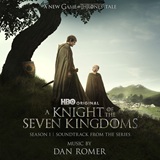 "A Knight of the Seven Kingdoms" is set in the same universe as "Game of Thrones" and "House of Dragon" but it is a different beast entirely. "A Knight of the Seven Kingdoms" is based on G. R. R. Martin's "Tales of Dunk and Egg" novellas and set in the period before the events of "Game of Thrones". Where "Game of Thrones" was epic in scale with big players from major dynasties leading huge armies into battle, "A Knight of the Seven Kingdoms" is smaller in scale, more intimate and personal, sometimes emotional and with space for quirky characters and even some comedy. Likewise the music has also changed in character. Largely gone are the major orchestral set pieces, and instead we have moved to sparce orchestration with guitar, solo strings, fiddle and simpler folk-like music, with percussion and some strings. The composer for the new series is Dan Romer rather than Ramin Djawadi, although the latter's main GoT theme is used in the track "Let the Gods Decide". The soundtrack from Series One is now released by "WaterTower Music" and available to stream from the usual streaming services via lnk.to/AKOTSKPR.
"A Knight of the Seven Kingdoms" is set in the same universe as "Game of Thrones" and "House of Dragon" but it is a different beast entirely. "A Knight of the Seven Kingdoms" is based on G. R. R. Martin's "Tales of Dunk and Egg" novellas and set in the period before the events of "Game of Thrones". Where "Game of Thrones" was epic in scale with big players from major dynasties leading huge armies into battle, "A Knight of the Seven Kingdoms" is smaller in scale, more intimate and personal, sometimes emotional and with space for quirky characters and even some comedy. Likewise the music has also changed in character. Largely gone are the major orchestral set pieces, and instead we have moved to sparce orchestration with guitar, solo strings, fiddle and simpler folk-like music, with percussion and some strings. The composer for the new series is Dan Romer rather than Ramin Djawadi, although the latter's main GoT theme is used in the track "Let the Gods Decide". The soundtrack from Series One is now released by "WaterTower Music" and available to stream from the usual streaming services via lnk.to/AKOTSKPR.
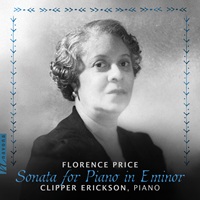
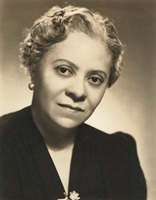 In 1932 Florence Price (1887–1953) won 2 different places in the Rodman Wanamaker Prize, 1st place for her Symphony in E minor and 3rd place for her Piano Sonata also in E minor. Her student, Margaret Bonds, won a Wanamaker Prize in the same year for her song "Sea Ghost". It is easy to see that 1932 was therefore a turning point in Price's career, and she soon became the first African-American woman to have her music played by a major U.S. orchestra. A new recording of the Piano Sonata in E minor mentioned above has been made by pianist Clipper Erickson. The sonata is structurally built on the classical traditions of the Romantic Era, but uses elements of both the melodic and rhythmic invention that comes from African American music traditions. The new recording will be released on the Navona Records label, on streaming platforms on February 6th, though you can hear the beautiful heartfelt slow movement at this link on youtube.
In 1932 Florence Price (1887–1953) won 2 different places in the Rodman Wanamaker Prize, 1st place for her Symphony in E minor and 3rd place for her Piano Sonata also in E minor. Her student, Margaret Bonds, won a Wanamaker Prize in the same year for her song "Sea Ghost". It is easy to see that 1932 was therefore a turning point in Price's career, and she soon became the first African-American woman to have her music played by a major U.S. orchestra. A new recording of the Piano Sonata in E minor mentioned above has been made by pianist Clipper Erickson. The sonata is structurally built on the classical traditions of the Romantic Era, but uses elements of both the melodic and rhythmic invention that comes from African American music traditions. The new recording will be released on the Navona Records label, on streaming platforms on February 6th, though you can hear the beautiful heartfelt slow movement at this link on youtube.

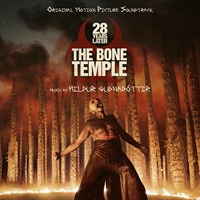 The "28 Later" series of movies has become a franchise. Over the years the series has served up some top class music scores. John Murphy did "Days" and "Weeks" which both included the hit track "In the House - In a Heartbeat", then "Years" featured a terrific soundtrack by Scottish hip-hop trio "Young Fathers". It seems that "Years" wasn't the last in a "28" trilogy, but the first in a new "28 Years" trilogy. "28 Years Later: The Bone Temple" is the 2nd of 3 "Years" movies and released theatrically just last week. This is scored by none other than oscar and multi-award winning composer Hildur Guðnadóttir whose skills (while multi-dimensional) are very well suited to the horror genre. The score (also released last week) is decidedly unsettling. There is a recurring main theme with string chords playing a solemn dirge-like requiem - its halting chords give the feel of a baroque Sarabande despite using a different rhythm. There are soundscapes comprised of scifi-like drones, sounds like a cross between a foghorn and a didgeridoo, dry percussive sounds including metal on metal but mostly wood on wood, or perhaps it is bone on bone? And most unsettling of all are the animalistic grunts and breathing sounds. The score is available from all the usual streaming services via Soundtracks Link: The Bone Temple and here is the Movie Trailer.
The "28 Later" series of movies has become a franchise. Over the years the series has served up some top class music scores. John Murphy did "Days" and "Weeks" which both included the hit track "In the House - In a Heartbeat", then "Years" featured a terrific soundtrack by Scottish hip-hop trio "Young Fathers". It seems that "Years" wasn't the last in a "28" trilogy, but the first in a new "28 Years" trilogy. "28 Years Later: The Bone Temple" is the 2nd of 3 "Years" movies and released theatrically just last week. This is scored by none other than oscar and multi-award winning composer Hildur Guðnadóttir whose skills (while multi-dimensional) are very well suited to the horror genre. The score (also released last week) is decidedly unsettling. There is a recurring main theme with string chords playing a solemn dirge-like requiem - its halting chords give the feel of a baroque Sarabande despite using a different rhythm. There are soundscapes comprised of scifi-like drones, sounds like a cross between a foghorn and a didgeridoo, dry percussive sounds including metal on metal but mostly wood on wood, or perhaps it is bone on bone? And most unsettling of all are the animalistic grunts and breathing sounds. The score is available from all the usual streaming services via Soundtracks Link: The Bone Temple and here is the Movie Trailer.
 I'm very pleased to reveal that our mfiles parent company Music Files Ltd has won a Scottish Enterprise Award in the Category "Best Sheet Music Resource 2025". It is hard to believe that it was 25 years ago that we first started publishing sheet music on mfiles. In many ways it was a timid experimental start, testing the feasibility of site dedicated to music, especially classical and film music which at that time seemed to be completely separate worlds. In terms of sheet music the site now has 591 score pages offering a total of 1457 PDF sheet music files to download. And the number is still growing on a regular basis. So we truly appreciate this Award. The award announcement can be found on the SME News website at SME News.
I'm very pleased to reveal that our mfiles parent company Music Files Ltd has won a Scottish Enterprise Award in the Category "Best Sheet Music Resource 2025". It is hard to believe that it was 25 years ago that we first started publishing sheet music on mfiles. In many ways it was a timid experimental start, testing the feasibility of site dedicated to music, especially classical and film music which at that time seemed to be completely separate worlds. In terms of sheet music the site now has 591 score pages offering a total of 1457 PDF sheet music files to download. And the number is still growing on a regular basis. So we truly appreciate this Award. The award announcement can be found on the SME News website at SME News.
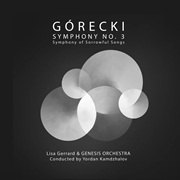 Released today in physical formats is Henryk Górecki's Symphony No.3 (Symphony of Sorrowful Songs). The singer is none other than Lisa Gerrard who is best known for her work on film soundtracks. She sang the voice part on Hans Zimmer's original "Gladiator", and has kept up that relationship appearing earlier this week in Glasgow as part of Zimmer's "The Next Level" tour and will return to Scotland in 2026 for "Gladiator in Concert". The Gorecki album was released in 2020 in digital format to stream/download but now we see it released on both CD and Vinyl. Górecki is often associated with avant-garde music, but his symphony no.3 sees the Polish composer creating music which is very tonal. Indeed the music is based on older techniques including polyphony and modes. Sorrowful Songs is indeed an apt description, with the texts based on tragic stories of loss. The final track on the album is by Beinsa Douno (aka Peter Deunov, the Bulgarian philosopher and religious leader). "Vehadi" with voice and strings initially matches the tone of the Górecki Symphony (which it predates), though evolving into something louder and more complex. You can check out the products using this link Henryk Górecki: Symphony No.3 - physical album.
Released today in physical formats is Henryk Górecki's Symphony No.3 (Symphony of Sorrowful Songs). The singer is none other than Lisa Gerrard who is best known for her work on film soundtracks. She sang the voice part on Hans Zimmer's original "Gladiator", and has kept up that relationship appearing earlier this week in Glasgow as part of Zimmer's "The Next Level" tour and will return to Scotland in 2026 for "Gladiator in Concert". The Gorecki album was released in 2020 in digital format to stream/download but now we see it released on both CD and Vinyl. Górecki is often associated with avant-garde music, but his symphony no.3 sees the Polish composer creating music which is very tonal. Indeed the music is based on older techniques including polyphony and modes. Sorrowful Songs is indeed an apt description, with the texts based on tragic stories of loss. The final track on the album is by Beinsa Douno (aka Peter Deunov, the Bulgarian philosopher and religious leader). "Vehadi" with voice and strings initially matches the tone of the Górecki Symphony (which it predates), though evolving into something louder and more complex. You can check out the products using this link Henryk Górecki: Symphony No.3 - physical album.
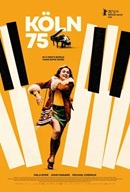
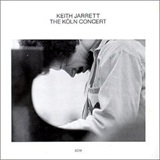 A new film released earlier this year is Köln 75 (aka "The Girl from Cologne"). It is a biographical drama about Vera Brandes, who in 1975 at the age of 18, staged the famous Köln Concert by jazz/classical musician Keith Jarrett. This amazing story is worth retelling in this its 50th anniversary year. The concert took place in the Köln Opera House, but the fully sold-out Jazz concert couldn't start until 11:30 due to an earlier opera. Keith Jarrett arrived in the afternoon after a long car journey from his prior tour location in Switzerland. The piano was a disaster. Instead of a concert grand, he had a beaten up baby grand found in a back room previously used only for practice purposes at the Opera House. While a piano tuner tried to tune and fix as much of the piano as he could, Jarrett tried and largely failed to get a meal. He very nearly cancelled the show, but in the spirit of the show must go on the concert went ahead. Jarrett largely improvised the whole concert, favouring the better middle parts of the piano, compensating for the weak bass notes, making a feature of some buzzy notes and using the noisy pedals for their percussive qualities! The concert was recorded but was found to have a lot of background audience sound (in addition to Jarrett's own vocalisations). Despite this the recording was released as "The Kohn Concert" and became the best-selling solo album in jazz history and the best-selling piano album. You can hear it on streaming platforms (Apple Music, Spotify or YouTube). Following 2 strokes in 2018 Jarrett no longer gives concerts, having lost much of the use of his left hand. Look out for the film, currently on the Festival Circuit.
A new film released earlier this year is Köln 75 (aka "The Girl from Cologne"). It is a biographical drama about Vera Brandes, who in 1975 at the age of 18, staged the famous Köln Concert by jazz/classical musician Keith Jarrett. This amazing story is worth retelling in this its 50th anniversary year. The concert took place in the Köln Opera House, but the fully sold-out Jazz concert couldn't start until 11:30 due to an earlier opera. Keith Jarrett arrived in the afternoon after a long car journey from his prior tour location in Switzerland. The piano was a disaster. Instead of a concert grand, he had a beaten up baby grand found in a back room previously used only for practice purposes at the Opera House. While a piano tuner tried to tune and fix as much of the piano as he could, Jarrett tried and largely failed to get a meal. He very nearly cancelled the show, but in the spirit of the show must go on the concert went ahead. Jarrett largely improvised the whole concert, favouring the better middle parts of the piano, compensating for the weak bass notes, making a feature of some buzzy notes and using the noisy pedals for their percussive qualities! The concert was recorded but was found to have a lot of background audience sound (in addition to Jarrett's own vocalisations). Despite this the recording was released as "The Kohn Concert" and became the best-selling solo album in jazz history and the best-selling piano album. You can hear it on streaming platforms (Apple Music, Spotify or YouTube). Following 2 strokes in 2018 Jarrett no longer gives concerts, having lost much of the use of his left hand. Look out for the film, currently on the Festival Circuit.
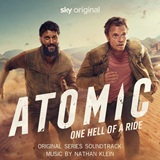 The last time I mentioned Nathan Klein was in the context of the TV series "Ludwig" with its quirky Beethoven inspired music. The composer's music for Atomic is a complete contrast. "Atomic" is a drama series which concerns two ordinary men caught up in a plot to traffic Uranium across North Africa and the Middle East, dodging international criminals and intelligence agencies! On this occasion the music balances a mix of atmospherics with plenty of beat driven action tracks. There are some recurring thematic elements, and it makes good use of electro-acoustics and detuned sounds with some tracks reminiscent of "Requiem for a Dream". "Atomic" is available on Sky TV and the Nathan Klein soundtrack is available on streaming platforms including these links on Apple Music and Spotify.
The last time I mentioned Nathan Klein was in the context of the TV series "Ludwig" with its quirky Beethoven inspired music. The composer's music for Atomic is a complete contrast. "Atomic" is a drama series which concerns two ordinary men caught up in a plot to traffic Uranium across North Africa and the Middle East, dodging international criminals and intelligence agencies! On this occasion the music balances a mix of atmospherics with plenty of beat driven action tracks. There are some recurring thematic elements, and it makes good use of electro-acoustics and detuned sounds with some tracks reminiscent of "Requiem for a Dream". "Atomic" is available on Sky TV and the Nathan Klein soundtrack is available on streaming platforms including these links on Apple Music and Spotify.
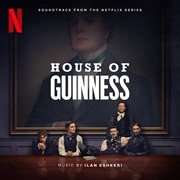 "House of Guinness" is the new Netflix TV Series dramatising the famous Guinness family and set in Dublin and New York. The music is by the composer Ilan Eshkeri who last year picked up the "Hollywood Music in Media Award" for Best Documentary Score for "Super/Man: The Christopher Reeve Story". His approach for House of Guinness starts with Irish folk music at the centre, depicting not just the period and the setting but also the eccentric individual characters involved in the Guinness story. Around this folk core Eshkeri has incorporated a range of more modern instrumentation and scoring techniques, with electric guitars, and electronics and various vocal textures cemented with the power of a full orchestra. The result is musically as genre-bending as the story-telling and characterisation. The score is available now across music streaming services via this link netflixmusic.ffm.to/houseofguinness.
"House of Guinness" is the new Netflix TV Series dramatising the famous Guinness family and set in Dublin and New York. The music is by the composer Ilan Eshkeri who last year picked up the "Hollywood Music in Media Award" for Best Documentary Score for "Super/Man: The Christopher Reeve Story". His approach for House of Guinness starts with Irish folk music at the centre, depicting not just the period and the setting but also the eccentric individual characters involved in the Guinness story. Around this folk core Eshkeri has incorporated a range of more modern instrumentation and scoring techniques, with electric guitars, and electronics and various vocal textures cemented with the power of a full orchestra. The result is musically as genre-bending as the story-telling and characterisation. The score is available now across music streaming services via this link netflixmusic.ffm.to/houseofguinness.
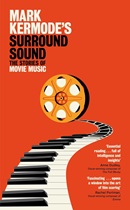 To most people Mark Kermode probably needs no introduction. He has been a film critic for many years across a raft of different media, from newspapers and books to radio, television and blogs. He also has a keen interest in film music presenting a film music show on Scala Radio, and his latest book on this topic will be released on 11th September (Link: Amazon.co.uk). Called "Mark Kermode's Surround Sound" and subtitled "The Stories of Movie Music" this book is a collaboration with Jenny Nelson who was previously an Executive Producer at Classic FM. The book examines the emotional impact of film music, and its evolution from the days of silent cinema. The book includes interviews with a number of film composers, considers how directors and composers work together, and also examines in greater depth some of the authors' favourite film scores. The book was presented at the Edinburgh International Book Festival last month, and the authors will also be presenting it at a number of other festivals and events across the country. See the full List of Events.
To most people Mark Kermode probably needs no introduction. He has been a film critic for many years across a raft of different media, from newspapers and books to radio, television and blogs. He also has a keen interest in film music presenting a film music show on Scala Radio, and his latest book on this topic will be released on 11th September (Link: Amazon.co.uk). Called "Mark Kermode's Surround Sound" and subtitled "The Stories of Movie Music" this book is a collaboration with Jenny Nelson who was previously an Executive Producer at Classic FM. The book examines the emotional impact of film music, and its evolution from the days of silent cinema. The book includes interviews with a number of film composers, considers how directors and composers work together, and also examines in greater depth some of the authors' favourite film scores. The book was presented at the Edinburgh International Book Festival last month, and the authors will also be presenting it at a number of other festivals and events across the country. See the full List of Events.
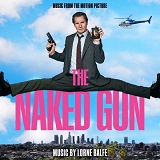
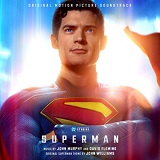 Two film soundtracks released this month are based on rebooted or reimagined movies, and those soundtracks both pay homage to their previous scores. The Naked Gun soundtrack is scored by Lorne Balfe and has a lot crammed into its short 30 minute run-time. It is jazzy in places (like the original) with some Bond-like suspense and some tongue-in-cheek Zimmeresque action sequences. There is a droll song sung by Liam Neeson, and a more inventive scat-like song featuring the voice of Pamela Anderson, while the homage to the Ira Newborn original theme (from the TV series Police Squad) is kept to the end. In contrast the new Superman score (by John Murphy and David Fleming) is much longer and integrates the original John Williams theme throughout the movie in really inventive ways such as changing the chord sequence. The scoring feels like a new take on the superhero score, with perhaps a bit more guitar than previous examples of the genre. It's certainly not wall-to-wall action, so there is space for the score to breathe, and it all makes for a very satisfying listen. Here are streaming links for The Naked Gun and for Superman.
Two film soundtracks released this month are based on rebooted or reimagined movies, and those soundtracks both pay homage to their previous scores. The Naked Gun soundtrack is scored by Lorne Balfe and has a lot crammed into its short 30 minute run-time. It is jazzy in places (like the original) with some Bond-like suspense and some tongue-in-cheek Zimmeresque action sequences. There is a droll song sung by Liam Neeson, and a more inventive scat-like song featuring the voice of Pamela Anderson, while the homage to the Ira Newborn original theme (from the TV series Police Squad) is kept to the end. In contrast the new Superman score (by John Murphy and David Fleming) is much longer and integrates the original John Williams theme throughout the movie in really inventive ways such as changing the chord sequence. The scoring feels like a new take on the superhero score, with perhaps a bit more guitar than previous examples of the genre. It's certainly not wall-to-wall action, so there is space for the score to breathe, and it all makes for a very satisfying listen. Here are streaming links for The Naked Gun and for Superman.
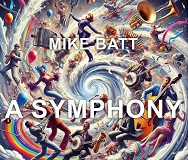
 Mike Batt (famous for "The Wombles") has launched his latest project. He is composing a "Ukraine Symphony" to support Ukraine as it continues to struggle in a war of survival. The aim is to record the Symphony in Kyiv, directly supporting Ukrainian musicians and studios. The symphony is still a work in progress but its structure is mapped out and the target date for the recording is October or November 2025. A CrowdFunder has been set up so anyone can support the project, raising funds for the recording - see crowdfunder.co.uk/p/a-ukraine-symphony . You can subscribe to the Crowd Funder at different levels to receive various items of merchandise, including a signed limited edition sketch of Orinoco conducting. Batt is also creating a video series to give people regular progress updates on the Symphony and overall project. The latest in the video series is Episode 4 which you can watch here on youtube - Episode 4 (short version).
Mike Batt (famous for "The Wombles") has launched his latest project. He is composing a "Ukraine Symphony" to support Ukraine as it continues to struggle in a war of survival. The aim is to record the Symphony in Kyiv, directly supporting Ukrainian musicians and studios. The symphony is still a work in progress but its structure is mapped out and the target date for the recording is October or November 2025. A CrowdFunder has been set up so anyone can support the project, raising funds for the recording - see crowdfunder.co.uk/p/a-ukraine-symphony . You can subscribe to the Crowd Funder at different levels to receive various items of merchandise, including a signed limited edition sketch of Orinoco conducting. Batt is also creating a video series to give people regular progress updates on the Symphony and overall project. The latest in the video series is Episode 4 which you can watch here on youtube - Episode 4 (short version).
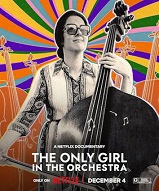 On mfiles we track the main media music awards including the music awards from the Oscars, Golden Globes and BAFTAs. But occasionally there are other awards of interest to music fans. "The Only Girl in the Orchestra" is a short Netflix documentary film which won the "Best Documentary Short Film" at this year's Oscars. Directed by Molly O'Brien, the film was about her aunt Orin O'Brien, a double-bass player who in 1966 was hired by Leonard Bernstein for the New York Philharmonic. That appointment made her the orchestra's first female player, and she went on to have a successful career there and as a music teacher at the Juilliard School and other music colleges. She stayed with the New York Philharmonic until she retired in 2021, and some of the film's footage dates from this period. The film also shows Orin with a number of her current and past students, and there are some domestic scenes of Orin with Molly while the soundtrack features plenty of double bass music with Beethoven, Mahler and others. The film has been screened at a number of festivals and is still available on Netflix if you search for "only girl".
On mfiles we track the main media music awards including the music awards from the Oscars, Golden Globes and BAFTAs. But occasionally there are other awards of interest to music fans. "The Only Girl in the Orchestra" is a short Netflix documentary film which won the "Best Documentary Short Film" at this year's Oscars. Directed by Molly O'Brien, the film was about her aunt Orin O'Brien, a double-bass player who in 1966 was hired by Leonard Bernstein for the New York Philharmonic. That appointment made her the orchestra's first female player, and she went on to have a successful career there and as a music teacher at the Juilliard School and other music colleges. She stayed with the New York Philharmonic until she retired in 2021, and some of the film's footage dates from this period. The film also shows Orin with a number of her current and past students, and there are some domestic scenes of Orin with Molly while the soundtrack features plenty of double bass music with Beethoven, Mahler and others. The film has been screened at a number of festivals and is still available on Netflix if you search for "only girl".
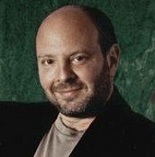 Mark Snow (whose real name was Martin Fulterman) died on Friday at the age of 78. He is best known for his music (and particularly the main theme) for the series "The X-Files" which ran for a total of 9 seasons with a number of spin-off movies and series. Snow created scores for a number of theatrical films, but it was as a prolific and hard-working television composer that he made his name. In that respect Snow contributed to many other US TV series, mini-series and TV movies, including "Starsky & Hutch", "Hart to Hart", "Dynasty", "Cagney & Lacey", "T. J. Hooker", "Crazy Like a Fox", "Falcon Crest", "Dark Justice", "Millennium" (an X-Files spinoff starring Lance Henriksen), "Smallville", "Ghost Whisperer", "Blue Bloods" as well as revivals of the series "The Twilight Zone" and "Kojak".
Mark Snow (whose real name was Martin Fulterman) died on Friday at the age of 78. He is best known for his music (and particularly the main theme) for the series "The X-Files" which ran for a total of 9 seasons with a number of spin-off movies and series. Snow created scores for a number of theatrical films, but it was as a prolific and hard-working television composer that he made his name. In that respect Snow contributed to many other US TV series, mini-series and TV movies, including "Starsky & Hutch", "Hart to Hart", "Dynasty", "Cagney & Lacey", "T. J. Hooker", "Crazy Like a Fox", "Falcon Crest", "Dark Justice", "Millennium" (an X-Files spinoff starring Lance Henriksen), "Smallville", "Ghost Whisperer", "Blue Bloods" as well as revivals of the series "The Twilight Zone" and "Kojak".
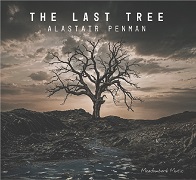 Alastair Penman is Professor of Saxophone at the Guildhall School of Music and Drama, among other roles. Penman has touched upon climate change in his music before, but the whole of "The Last Tree" album is about this topic. It was released on 5th June 2025 to coincide with World Environment Day, but climate change is very much in the news at the moment with meetings taking place under the auspices of the UNFCCC in the lead-up to COP30 in Brazil later this year. The British Antartic Survey are also reporting from the Antartic continent this week and noting the remarkable cumulation of climate changes affecting sea ice and glaciers even in winter. Penman's "The Last Tree" is a suite of 8 movements for saxophone orchestra, with each of the eight movements named after a quote made about climate change. For the studio album Penman himself has multitracked all the saxophone parts, recorded with absolute precision and clarity. The suite is largely accessible and melodic and feels optimistic overall, though there are moments of melancholy and dischord. There are jazzy episodes, some blues progressions, lyrical slow movements, a jazzy swing style scherzo and there's a certain affinity with the mission impossible 3322 syncopation (perhaps a rueful jest) plus a sly reference to "Rule Britannia". It's a fine album notable for its superb music as well as its message. The Release Website Alastair Penman: The Last Tree presents the music in a plethora of different formats including audio, visual, video and sheet music, with much supporting material to peruse at leisure.
Alastair Penman is Professor of Saxophone at the Guildhall School of Music and Drama, among other roles. Penman has touched upon climate change in his music before, but the whole of "The Last Tree" album is about this topic. It was released on 5th June 2025 to coincide with World Environment Day, but climate change is very much in the news at the moment with meetings taking place under the auspices of the UNFCCC in the lead-up to COP30 in Brazil later this year. The British Antartic Survey are also reporting from the Antartic continent this week and noting the remarkable cumulation of climate changes affecting sea ice and glaciers even in winter. Penman's "The Last Tree" is a suite of 8 movements for saxophone orchestra, with each of the eight movements named after a quote made about climate change. For the studio album Penman himself has multitracked all the saxophone parts, recorded with absolute precision and clarity. The suite is largely accessible and melodic and feels optimistic overall, though there are moments of melancholy and dischord. There are jazzy episodes, some blues progressions, lyrical slow movements, a jazzy swing style scherzo and there's a certain affinity with the mission impossible 3322 syncopation (perhaps a rueful jest) plus a sly reference to "Rule Britannia". It's a fine album notable for its superb music as well as its message. The Release Website Alastair Penman: The Last Tree presents the music in a plethora of different formats including audio, visual, video and sheet music, with much supporting material to peruse at leisure.
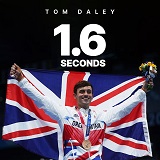
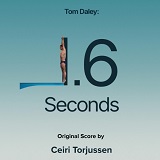 "Tom Daley: 1.6 Seconds" is a 90 minute documentary looking at the career of Olympic diving legend Tom Daley, from boyhood to the 14 year old representing his country at the 2008 Beijing Olympics, through to retirement at the age of 30. It is called 1.6 seconds because this is how long it takes for a diver to hit the water from the 10m diving platform, so the entire performance of rolls, flips and twists is all compressed into that brief time period. You can watch the documentary on Olympics.com or Discovery Plus. More information including the trailer and details for how to view the documentary can be found at this link on the Olympics website. The music is by composer Ceiri Torjussen. Parts of the score are quietly understated and thoughtful, following the ups and downs of Daley's personal struggles, as well as the ups and downs of his career. But it does rise nicely to highlight the incredible dedication and work-ethic required by athletes at this level to hone their craft despite the struggles and setbacks. You can hear the film score on the usual streaming platforms via this link: Ceiri Torjussen: Tom Daley 1.6 Seconds OST.
"Tom Daley: 1.6 Seconds" is a 90 minute documentary looking at the career of Olympic diving legend Tom Daley, from boyhood to the 14 year old representing his country at the 2008 Beijing Olympics, through to retirement at the age of 30. It is called 1.6 seconds because this is how long it takes for a diver to hit the water from the 10m diving platform, so the entire performance of rolls, flips and twists is all compressed into that brief time period. You can watch the documentary on Olympics.com or Discovery Plus. More information including the trailer and details for how to view the documentary can be found at this link on the Olympics website. The music is by composer Ceiri Torjussen. Parts of the score are quietly understated and thoughtful, following the ups and downs of Daley's personal struggles, as well as the ups and downs of his career. But it does rise nicely to highlight the incredible dedication and work-ethic required by athletes at this level to hone their craft despite the struggles and setbacks. You can hear the film score on the usual streaming platforms via this link: Ceiri Torjussen: Tom Daley 1.6 Seconds OST.
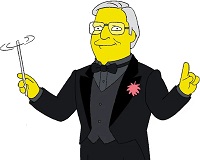
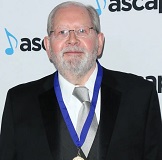 Long time composer for "The Simpsons" Alf Clausen has died at the age of 84. While Danny Elfman composed the theme music, it was Alf Clausen who provided the show's incidental music and occasional songs for show after show. Every week he introduced different genres and wonderful pastiches of various composers and film styles, with halloween horror being an annual event. His last Simpsons episode was in 2017 after 27 years in the job, though he occasionally contributed to later scores. He worked on many other TV shows (from "Donny and Marie" and "The Mary Tyler Moore Hour" in the 1970s through "Moonlighting" and "Bette" to "The Simpsons" and "ALF" - no relation) and a number of films as Composer, Orchestrator, Conductor, Musical Director and Additional Music. His Simpsons music was also released on several albums.
Long time composer for "The Simpsons" Alf Clausen has died at the age of 84. While Danny Elfman composed the theme music, it was Alf Clausen who provided the show's incidental music and occasional songs for show after show. Every week he introduced different genres and wonderful pastiches of various composers and film styles, with halloween horror being an annual event. His last Simpsons episode was in 2017 after 27 years in the job, though he occasionally contributed to later scores. He worked on many other TV shows (from "Donny and Marie" and "The Mary Tyler Moore Hour" in the 1970s through "Moonlighting" and "Bette" to "The Simpsons" and "ALF" - no relation) and a number of films as Composer, Orchestrator, Conductor, Musical Director and Additional Music. His Simpsons music was also released on several albums.
 Season 2 of "The Last of Us" (based on the post-apocalyptic zombie video game of the same name) has recently finished, and the film soundtrack released, with the same composing team as Season 1 consisting of Gustavo Santaolalla and David Fleming. The Argentine composer Santaolalla needs no introduction with his extensive career, including back-to-back oscars for "Brokeback Mountain" and "Babel" and further awards for "The Motorcycle Diaries". Fleming has worked with Hans Zimmer on the likes of "Blue Planet II", the 2 "Dune" films and "Top Gun: Maverick" and we've previously mentioned his score for Netflix's "Damsel". Santaolalla tends to focus on the moody atmospheric tracks, mostly featuring his signature guitar sound, while Fleming seems to focus on the narrative tracks with plenty of dystopian action. The soundtrack also includes some songs from the series including A-ha's song "Take on Me" sung by Bella Ramsey who plays Ellie in the series. You can listen to the soundtrack on the main streaming channels via this link thelastofus.lnk.to/HBOSeason2 and yes, The Last of Us has been renewed for Season 3!
Season 2 of "The Last of Us" (based on the post-apocalyptic zombie video game of the same name) has recently finished, and the film soundtrack released, with the same composing team as Season 1 consisting of Gustavo Santaolalla and David Fleming. The Argentine composer Santaolalla needs no introduction with his extensive career, including back-to-back oscars for "Brokeback Mountain" and "Babel" and further awards for "The Motorcycle Diaries". Fleming has worked with Hans Zimmer on the likes of "Blue Planet II", the 2 "Dune" films and "Top Gun: Maverick" and we've previously mentioned his score for Netflix's "Damsel". Santaolalla tends to focus on the moody atmospheric tracks, mostly featuring his signature guitar sound, while Fleming seems to focus on the narrative tracks with plenty of dystopian action. The soundtrack also includes some songs from the series including A-ha's song "Take on Me" sung by Bella Ramsey who plays Ellie in the series. You can listen to the soundtrack on the main streaming channels via this link thelastofus.lnk.to/HBOSeason2 and yes, The Last of Us has been renewed for Season 3!
![]() "Morricone Segreto" (or Secret Morricone) is an album of selected tracks from Ennio Morricone's film scores. These are not the well-known tracks from his best loved films, but rather tracks apparently selected for their weirdness. This is Morricone at his most outlandish, uncompromising and psychedelic. The strange thing is that despite the selectivity, the music is all recognisably Morricone. You can expect to hear lots of 70s electronic organ sounds, with latin beats, effects guitar riffs, unlikely instrumentation, unnatural voices, bits of avant garde, jazz, lounge & world music, and some grotesque comic turns, with scoring that would sound completely at home in genres as diverse as horror, sci-fi, noir, drug-related, crime, thriller, and psychological. As the sleeve notes state "an eccentric underground genius who used his refined education to implant cultured materials in a daily, popular context". The only track that was thematically familiar to me was the Sicilian Clan theme, and I suspect some of the movies represented were not released in English versions, but the album simply underlines how eccentric and revolutionary was Morricone's approach to film music. The album is available on streaming services, and in CD form from Amazon.com and Amazon.co.uk where you can also see a full track listing.
"Morricone Segreto" (or Secret Morricone) is an album of selected tracks from Ennio Morricone's film scores. These are not the well-known tracks from his best loved films, but rather tracks apparently selected for their weirdness. This is Morricone at his most outlandish, uncompromising and psychedelic. The strange thing is that despite the selectivity, the music is all recognisably Morricone. You can expect to hear lots of 70s electronic organ sounds, with latin beats, effects guitar riffs, unlikely instrumentation, unnatural voices, bits of avant garde, jazz, lounge & world music, and some grotesque comic turns, with scoring that would sound completely at home in genres as diverse as horror, sci-fi, noir, drug-related, crime, thriller, and psychological. As the sleeve notes state "an eccentric underground genius who used his refined education to implant cultured materials in a daily, popular context". The only track that was thematically familiar to me was the Sicilian Clan theme, and I suspect some of the movies represented were not released in English versions, but the album simply underlines how eccentric and revolutionary was Morricone's approach to film music. The album is available on streaming services, and in CD form from Amazon.com and Amazon.co.uk where you can also see a full track listing.
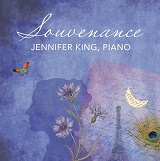 Releasing today is the latest album "Souvenance" by Canadian pianist Jennifer King. Most tracks are "nocturnes" with some "romances" and a "meditation" and King's playing flows beautifully, shining a light on the melodic lines without swamping other layers. The album opens with 2 tracks by Mel Bonis, the prolific and largely self-taught French composer. The Soirées Musicales by the famous Clara Schumann (muse to both Schumann and Brahms) is very much in the mold of Chopin and her husband Robert. A shorter nocturne by Dame Ethel Smyth leads to another Nocturne by Felix's sister Fanny Mendelssohn-Hensel with its delightful cadenza-like middle section. The next 3 tracks by Cécile Chaminade are the heart of the album, providing both the title track "Souvenance" and the one released as a single, the hymn-like Meditation. The final 3 tracks stretch us from the Romantic era, towards impressionism with the talented composer/pianist Sophie-Carmen Eckhardt-Gramatté or towards jazz with the Gershwin-like Jazz Nocturne, one of the better known works by the American composer Dana Suesse. The album concludes with the pianist's own arrangement of "Blue" by Joni Mitchell. Yes, all the composers on the album are women and often unfairly neglected, but they are composers of the highest calibre. The album (and single) is available from the usual online services including Apple Music and Spotify, and is highly recommended. King's website is at jenniferkingpiano.com.
Releasing today is the latest album "Souvenance" by Canadian pianist Jennifer King. Most tracks are "nocturnes" with some "romances" and a "meditation" and King's playing flows beautifully, shining a light on the melodic lines without swamping other layers. The album opens with 2 tracks by Mel Bonis, the prolific and largely self-taught French composer. The Soirées Musicales by the famous Clara Schumann (muse to both Schumann and Brahms) is very much in the mold of Chopin and her husband Robert. A shorter nocturne by Dame Ethel Smyth leads to another Nocturne by Felix's sister Fanny Mendelssohn-Hensel with its delightful cadenza-like middle section. The next 3 tracks by Cécile Chaminade are the heart of the album, providing both the title track "Souvenance" and the one released as a single, the hymn-like Meditation. The final 3 tracks stretch us from the Romantic era, towards impressionism with the talented composer/pianist Sophie-Carmen Eckhardt-Gramatté or towards jazz with the Gershwin-like Jazz Nocturne, one of the better known works by the American composer Dana Suesse. The album concludes with the pianist's own arrangement of "Blue" by Joni Mitchell. Yes, all the composers on the album are women and often unfairly neglected, but they are composers of the highest calibre. The album (and single) is available from the usual online services including Apple Music and Spotify, and is highly recommended. King's website is at jenniferkingpiano.com.
Live to Screen Concerts are becoming a lot more popular than they once were. The Royal Scottish National Orchestra (RSNO) have announced that they will be performing a series of 5 such concerts during their 2025-2026 Season in both Edinburgh and Glasgow, as follows:
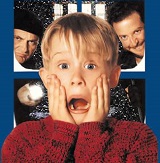
Music by John Williams, RSNO conducted by Robert Ziegler
Music by Elmer Bernstein, RSNO conducted by Anthony Parnther
Music by John Williams, RSNO conducted by Ben Palmer
Music by John Powell, RSNO conducted by Ben Palmer
Music by Hans Zimmer & Lisa Gerrard, RSNO Chorus directed by Stephen Doughty
For details of dates and times see the RSNO What's On page.
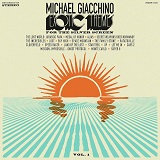 "Exotic Themes for the Silver Screen" features music from Michael Giacchino's Film, TV and Game scores but with a distinctive Hawaiian vibe. We know Giacchino's animation scores like "The Incredibles", "Ratatouille" and "Up" feature some easy listening and jazz, so it's not too surprising to see the composer get involved in a project like this. Exotica emerged as a music genre in the 1950s with a dreamy concoction of tropical islands, jungles, and far-off places, using various world instruments. It was never authentic but a convenient "exotic" fantasy. This is the world which Giacchino inhabits with this album. "Volume One" features tracks in chronological order from "The Lost World: Jurassic Park" in 1997 to "Super 8 Suite" in 2011. So we can surely expect Volume Two to pick up from here! The themes are recognisable but the scores sound completely different on Vibraphone, Marimba, Hawaiian Slide Guitar, Latin Percussion, Piano, Guitars, Bass, etc.. Play the CD the old-fashioned way in a CD player, and the album is called "Live From Honolulu" with each track prefixed "LFH"! Either it's an error or a leg-pull easter egg! The album is available on Amazon.com and Amazon.co.uk or on music streaming services such as Spotify or Youtube.
"Exotic Themes for the Silver Screen" features music from Michael Giacchino's Film, TV and Game scores but with a distinctive Hawaiian vibe. We know Giacchino's animation scores like "The Incredibles", "Ratatouille" and "Up" feature some easy listening and jazz, so it's not too surprising to see the composer get involved in a project like this. Exotica emerged as a music genre in the 1950s with a dreamy concoction of tropical islands, jungles, and far-off places, using various world instruments. It was never authentic but a convenient "exotic" fantasy. This is the world which Giacchino inhabits with this album. "Volume One" features tracks in chronological order from "The Lost World: Jurassic Park" in 1997 to "Super 8 Suite" in 2011. So we can surely expect Volume Two to pick up from here! The themes are recognisable but the scores sound completely different on Vibraphone, Marimba, Hawaiian Slide Guitar, Latin Percussion, Piano, Guitars, Bass, etc.. Play the CD the old-fashioned way in a CD player, and the album is called "Live From Honolulu" with each track prefixed "LFH"! Either it's an error or a leg-pull easter egg! The album is available on Amazon.com and Amazon.co.uk or on music streaming services such as Spotify or Youtube.
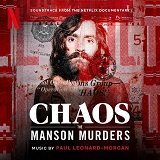 "Chaos: The Manson Murders" is now released on Netflix. It's a documentary film directed by Errol Morris which re-examines information and mis-information surrounding the infamous Manson Murders which took place back in the 1960s. Manson was a cult leader who used LSD among other methods to assist his mind control techniques. The documentary asks were there also multiple layers of conspiracy involving shadowy figures and the CIA? The score was composed by Paul Leonard-Morgan, whose collaboration with Philip Glass "Tales from the Loop" I am familar with. There's certainly a minimalist element to the documentary score, but the commonality ends there. The documentary score has a certain edgy tension with plenty of electronic sounds and a certain rock-vibe augmenting orchestral strings. Manson himself was a musician and the score also features spooky connections to Manson. It uses music written and recorded by Charles Manson himself, and it also uses the sounds of a pump organ that once belonged to Dennis Wilson of the Beach Boys, who collaborated with Manson before the murders. The score can be found on streaming channels via this link.
"Chaos: The Manson Murders" is now released on Netflix. It's a documentary film directed by Errol Morris which re-examines information and mis-information surrounding the infamous Manson Murders which took place back in the 1960s. Manson was a cult leader who used LSD among other methods to assist his mind control techniques. The documentary asks were there also multiple layers of conspiracy involving shadowy figures and the CIA? The score was composed by Paul Leonard-Morgan, whose collaboration with Philip Glass "Tales from the Loop" I am familar with. There's certainly a minimalist element to the documentary score, but the commonality ends there. The documentary score has a certain edgy tension with plenty of electronic sounds and a certain rock-vibe augmenting orchestral strings. Manson himself was a musician and the score also features spooky connections to Manson. It uses music written and recorded by Charles Manson himself, and it also uses the sounds of a pump organ that once belonged to Dennis Wilson of the Beach Boys, who collaborated with Manson before the murders. The score can be found on streaming channels via this link.
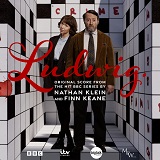 Ludwig is a TV series starring David Mitchell. "Ludwig" is the nickname of Mitchell's character, who lives alone and sets crossword puzzles for a living. When his twin brother disappears, he adopts his twin's identity to investigate, but the brothers seem like polar opposites - a major challenge for the reclusive Ludwig. With this nickname the series is just calling out for some Beethoven, and this is exactly what series composers Nathan Klein and Finn Keane have done. Themes from Beethoven's Symphonies, Piano Sonatas and other works are scattered liberally throughout the score. The soundtrack album starts off in full quirky manner, reflecting the humour of Ludwig adopting his brother's identity. It then becomes more convenional as Ludwig turns detective putting his puzzle skills into the task of solving the mystery disappearance, before the music returns to quirky mode. The score is available to download at Silva Screen Records. Whether or not you recognise the music, this is an enjoyable listen and it feels like the composers had a lot of fun with it. Does anyone remember a children's TV series from the 70s called "Ludwig" which also used Beethoven's music?
Ludwig is a TV series starring David Mitchell. "Ludwig" is the nickname of Mitchell's character, who lives alone and sets crossword puzzles for a living. When his twin brother disappears, he adopts his twin's identity to investigate, but the brothers seem like polar opposites - a major challenge for the reclusive Ludwig. With this nickname the series is just calling out for some Beethoven, and this is exactly what series composers Nathan Klein and Finn Keane have done. Themes from Beethoven's Symphonies, Piano Sonatas and other works are scattered liberally throughout the score. The soundtrack album starts off in full quirky manner, reflecting the humour of Ludwig adopting his brother's identity. It then becomes more convenional as Ludwig turns detective putting his puzzle skills into the task of solving the mystery disappearance, before the music returns to quirky mode. The score is available to download at Silva Screen Records. Whether or not you recognise the music, this is an enjoyable listen and it feels like the composers had a lot of fun with it. Does anyone remember a children's TV series from the 70s called "Ludwig" which also used Beethoven's music?
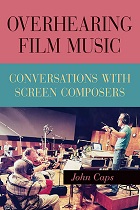 John Caps has recently published a new book called "Overhearing Film Music" and subtitled "Conversations with Screen Composers". John is a film music expert, who has written several books on the topic and contributed many articles about film music to a range of publications. He has known, corresponded with and interviewed many film music composers as part of his information gathering and research. If the name John Caps is familiar to regular mfiles visitors, this is because John is a regular contributor to mfiles, and certain chapters of this book are in fact greatly expanded versions of articles which were previously published on the mfiles website. The book has been published by SUNY Press and the Publishers Overview Page provides more information about the book. You can also find the book at Amazon.co.uk and Amazon.com, where it is available in both hardcover and kindle editions. Note that the Hardcover edition is priced as a text book for University Libraries, Conservatories and Foundations. A more affordable paperback will come out in six months time. I am proud to have played a small non-contributory part in the genesis of this book and gratified to have received a mention.
John Caps has recently published a new book called "Overhearing Film Music" and subtitled "Conversations with Screen Composers". John is a film music expert, who has written several books on the topic and contributed many articles about film music to a range of publications. He has known, corresponded with and interviewed many film music composers as part of his information gathering and research. If the name John Caps is familiar to regular mfiles visitors, this is because John is a regular contributor to mfiles, and certain chapters of this book are in fact greatly expanded versions of articles which were previously published on the mfiles website. The book has been published by SUNY Press and the Publishers Overview Page provides more information about the book. You can also find the book at Amazon.co.uk and Amazon.com, where it is available in both hardcover and kindle editions. Note that the Hardcover edition is priced as a text book for University Libraries, Conservatories and Foundations. A more affordable paperback will come out in six months time. I am proud to have played a small non-contributory part in the genesis of this book and gratified to have received a mention.
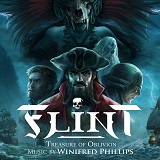 We are pleased to report that Winifred Phillips won a Grammy this year for her Game Score "Wizardry: Proving Ground of the Mad Overlord" (which we reported on last June). This success was in a category with many distinguished composers, so many congratulations are due to Winifred! Moving on to 2025 Winifred's latest score to be released is for the swashbuckling pirate game "Flint: Treasure of Oblivion". This has a great mix of action and atmosphere, which oozes with everything you would expect from a pirate score. The music is rooted in the traditional with period folk instruments, nautical folk melodies and some regional influences. Yet it is also a modern take on the pirate tale with rock guitar, weird ghostly vocalisations and atmospheric sound effects, and all this is held together with some infectiously rhythmic percussive beats. The score for "Flint: Treasure of Oblivion" is a great follow-up score, and could just as successful as "Wizardry". Stream or download the score from all good music apps.
We are pleased to report that Winifred Phillips won a Grammy this year for her Game Score "Wizardry: Proving Ground of the Mad Overlord" (which we reported on last June). This success was in a category with many distinguished composers, so many congratulations are due to Winifred! Moving on to 2025 Winifred's latest score to be released is for the swashbuckling pirate game "Flint: Treasure of Oblivion". This has a great mix of action and atmosphere, which oozes with everything you would expect from a pirate score. The music is rooted in the traditional with period folk instruments, nautical folk melodies and some regional influences. Yet it is also a modern take on the pirate tale with rock guitar, weird ghostly vocalisations and atmospheric sound effects, and all this is held together with some infectiously rhythmic percussive beats. The score for "Flint: Treasure of Oblivion" is a great follow-up score, and could just as successful as "Wizardry". Stream or download the score from all good music apps.
 The first ever London Soundtrack Festival is taking place 19th-26th March 2025, and it looks set to become an annual event. It will feature concerts, panel discussions, composer Q&A sessions, screenings, masterclasses, etc. The Event was conceived when the widow of film/tv composer Christopher Gunning spoke to musician and broadcaster Tommy Pearson. The festival will also have an associated award, the LSF Gunning Inspiration Award, to be presented this year to Howard Shore and his music will be featured in the Gala Concert to take place on Saturday 22nd, and during a screening of "The Silence of the Lambs" live in concert. Other concerts will include "State of the Art: Games Music Concert" and "Great Movie Songs". For more information as it becomes available, check out the Festival Website.
The first ever London Soundtrack Festival is taking place 19th-26th March 2025, and it looks set to become an annual event. It will feature concerts, panel discussions, composer Q&A sessions, screenings, masterclasses, etc. The Event was conceived when the widow of film/tv composer Christopher Gunning spoke to musician and broadcaster Tommy Pearson. The festival will also have an associated award, the LSF Gunning Inspiration Award, to be presented this year to Howard Shore and his music will be featured in the Gala Concert to take place on Saturday 22nd, and during a screening of "The Silence of the Lambs" live in concert. Other concerts will include "State of the Art: Games Music Concert" and "Great Movie Songs". For more information as it becomes available, check out the Festival Website.
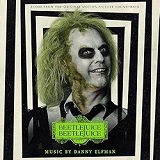 We're into 2025 now, and I'm still catching up with 2024 films, series and soundtracks. The original Beetlejuice has turned into something of a franchise: an animated series followed, a Broadway Musical has been launched and there's plenty of merchandise around. Now the sequel "Beetlejuice Beetlejuice" with most of the original film cast is a celebration, and it ticks all the right boxes to reference memorable moments and ideas from the original movie. The music also pulls off this trick but succeeds better in enhancing the original with some extra spice. Make sure you check out the Danny Elfman score (which has extended tracks not heard fully in the movie - Amazon.co.uk) rather than the soundtrack album. Elfman gives us Beetlejuice on steroids and there's a nice version of Harry Belafonte's "Day-O".
We're into 2025 now, and I'm still catching up with 2024 films, series and soundtracks. The original Beetlejuice has turned into something of a franchise: an animated series followed, a Broadway Musical has been launched and there's plenty of merchandise around. Now the sequel "Beetlejuice Beetlejuice" with most of the original film cast is a celebration, and it ticks all the right boxes to reference memorable moments and ideas from the original movie. The music also pulls off this trick but succeeds better in enhancing the original with some extra spice. Make sure you check out the Danny Elfman score (which has extended tracks not heard fully in the movie - Amazon.co.uk) rather than the soundtrack album. Elfman gives us Beetlejuice on steroids and there's a nice version of Harry Belafonte's "Day-O".
For current and recent new items, see Jim's Blog.
For older posts, the archive pages are Jim's Blog 2024, Jim's Blog 2023, Jim's Blog 2022, Jim's Blog 2021, Jim's Blog 2020, Jim's Blog 2019, Jim's Blog 2018, Jim's Blog 2017, Jim's Blog 2016, Jim's Blog 2015, Jim's Blog 2014, Jim's Blog 2013, Jim's Blog 2012, Jim's Blog 2011, Jim's Blog 2010, and Jim's Blog 2009.